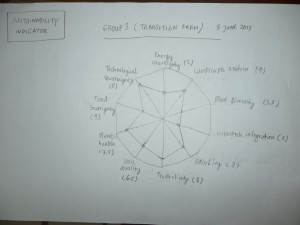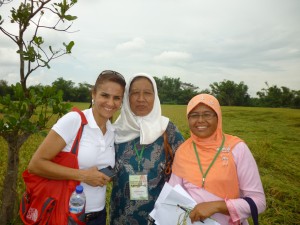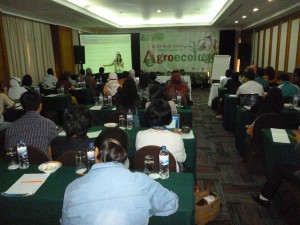The current challenges and trends in food security and climate change are great, and agroecology is increasingly recognized as the way forward. Agroecology, which uses ecological concepts and principles for the design and management of sustainable agricultural systems, has consistently proven capable of sustainably increasing productivity, and has far greater potential for fighting hunger, particularly during economic and climatically uncertain times.
Recognizing the urgent need for capacity building on agroecology in the sub-region, The Third World Network (TWN) and Aliansi Petani Indonesia (API, an AFA member) organized the Training Course to equip key actors with a comprehensive undertanding of agroecology, its principlesand concepts, and the evidence base. The training took place in Solo, Central Java on June 5-9, 2013.The resource persons were Prof. Miguel Altieri and Dr. Clara Nicholls from the Univerisity of California, Berkeley, USA. Both are recognized pioneers and experts in agroecology, and have published widely on the subject.
The training course coverd the following topics:
- agroecology and the planetary food, energy, economic and social crisis;

- principles and concepts of agroecology: the scientific basis;
- the ecological role of biodiversity in agroecosystems;
- biodiversity and insect pest management;
- soil ecology and management;
- ecological basis ofdisease and weed management;
- agroecological basis for the conversion to organic farming
- agroecology, small farm development and food sovereignty;
- agroecology and resiliency to climate change.
The training course participants were farmers, and representatives of farmers’ organizations and civil society organizations working on agroecology/ecological agriculture. API delegated its members and staffs to participate in the training course.
“Now I know the differences among practices such as natural farming, organic farming, and agroecological farming,” said Mrs. Mubayyinah, head of Istiqomah Peasant Union, API’s member from Banjarnegara District, Central Java Province. “Generally, natural farming and organic farming have similar standards, but organic farming gives more emphasis on

certification, while agroecology highlights the resources generated in the farm, including the animals that are raised near the farm. So we don’t need to transport the animal fertilizer to the farm. Agroecology also considers the landscape as an important resource of natural enemies and germplasm to support the farm.”
There was also a field trip to API’s member in Boyolali District, Central Java, APPOLI (Indonesian Organic Rice Peasant Alliance) for practical demonstrations. APPOLI has started to export their organic rice to Belgium in May 2013, after several years of certification process. It has been facilitated by VECO and the local government provided support in the form of equipment for organic fertilizer and composting house. During the field trip, the participants were split into three groups that visited the conventional farm, transition farm, and organic farms owned by APPOLI’s members.
During the training in class and in the field, participants were encouraged to share their experiences. They committed to share what they have learned from the training to other members of their organizations.




Comments are closed